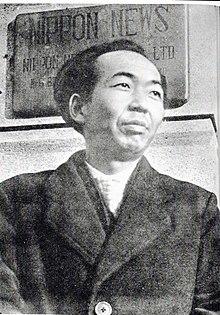Satsuo Yamamoto | |
|---|---|
 Satsuo Yamamoto in 1950. | |
| Born | July 15, 1910 |
| Died | August 11, 1983 (aged 73) |
| Occupation | Film director |
Satsuo Yamamoto (山本 薩夫, Yamamoto Satsuo, July 15, 1910 - August 11, 1983) was a Japanese film director.
Yamamoto was born in Kagoshima Prefecture on July 15, 1910. He dropped out of Waseda University to join Shochiku, where he worked as an assistant director to Mikio Naruse and others. He followed Naruse when he moved to PCL, and became a director in his own right after the company was reborn as Toho. During World War II he directed several pro-war propaganda films for them despite being a fervent member of the Japanese Communist Party (JCP), and after the war he rallied against the company as a driving force behind the union during the 1948 Toho labour dispute (in which the JCP was heavily involved), after which was ultimately fired.
He subsequently worked on independent films and made numerous intensely rebellious and substantial socially conscious works. From the 1960s onward, he directed a succession of major films including the Toyoko Yamasaki adaptations “The Ivory Tower” and “The Perfect Family”, the “Men and War” trilogy, and “Kotei no inai Hachigatsu”. This body of epic works led to him being dubbed “the Red Cecil B. DeMille”.
Three of his films, Shiroi Kyotō, Fumō Chitai and Ah! Nomugi Toge won the Mainichi Film Award for Best Film.[1][2][3]
He died of pancreatic cancer on August 11, 1983 at the age of 73.
In his posthumous autobiography, My Life as a Filmmaker, Yamamoto reflects on his career and legacy (University of Michigan Press, ISBN 978-0-472-07333-7).[4]
Selected filmography
| Year | Title (English) | Title (Original) | Notes |
|---|---|---|---|
| 1950 | Streets of Violence | ペン偽らず 暴力の街 (Pen Itsuwarazu, Boryoku no Machi; "The Pen Never Lies, Streets of Violence") | |
| 1966 | The White Tower | 白い巨塔 (Shiroi Kyotō) | 1966 Mainichi Film Award for Best Film [1] Entered into the 5th Moscow International Film Festival[5] |
| 1967 | Zatoichi the Outlaw | 座頭市牢破り (Zatōichi rōyaburi) | |
| 1976 | Wasted Land | 不毛地帯 (Fumō Chitai) | 1976 Mainichi Film Award for Best Film [2] |
| 1979 | Oh! The Nomugi Pass | あゝ野麦峠 (Ah! Nomugi Toge) | 1979 Mainichi Film Award for Best Film [3] |
References
"Satsuo Yamamoto Special Program". Tokyo Filmex 2007. Retrieved 23 August 2011.
- ^ a b 21 1966年 (in Japanese). japan-movie.net. Retrieved 2011-01-09.
- ^ a b 31 1976年 (in Japanese). japan-movie.net. Retrieved 2011-01-09.
- ^ a b 34 1979年 (in Japanese). japan-movie.net. Retrieved 2011-01-09.
- ^ Yamamoto, Satsuo (2017). My life as a filmmaker. Chang, Chia-ning. Baltimore, Maryland: Project Muse. ISBN 9780472122493. OCLC 990075123.
- ^ "5th Moscow International Film Festival (1967)". MIFF. Archived from the original on 2013-01-16. Retrieved 2012-12-09.
External links
- Kato, Mariko (2008-01-25). "SATSUO YAMAMOTO: Classic director remembered". The Japan Times. Retrieved 2008-01-31.
- Satsuo Yamamoto at IMDb
- 山本薩夫 (Satsuo Yamamoto) at the Japanese Movie Database (in Japanese)
- Satsuo Yamamoto obituary at New York Times